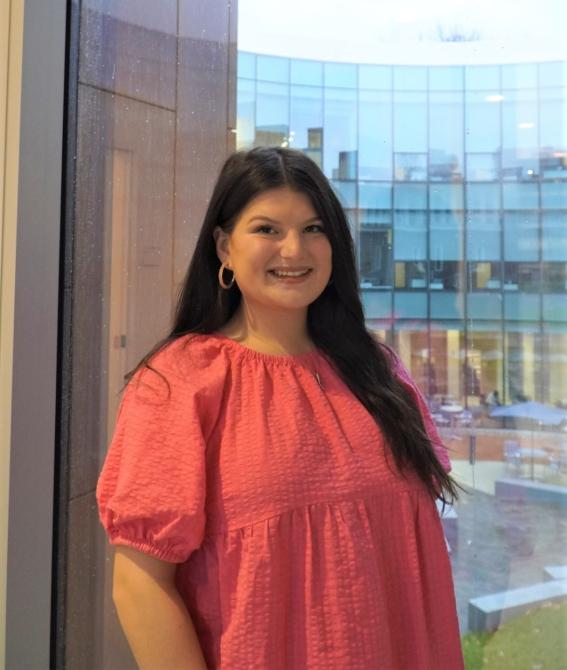Student Spotlight: Katherine Widrow '23
January 27, 2023

Katherine Widrow ’23, who is pursuing a minor in business at Isenberg, is double majoring in behavioral economics (BDIC) and psychology. She spoke with Isenberg social media intern Chloe Truong:
Where are you from?
I am from Stoughton, Massachusetts.
What year are you?
I am a senior, graduating in May.
How did you choose your majors?
I am visually impaired, so I have had a lot of doctors help me with my vision. I was inspired by this, so I originally wanted to pursue a career in neuroscience to help others like my doctors have helped me. However, during the summer leading into my freshman year, I had a fellowship at Fidelity Investments through Boundless, a program that enables exploration of the finance industry for young women. After being exposed to many strong women in finance during this fellowship, I was inspired by their great success and decided a career in finance was right for me.
After declaring a BDIC major in Behavioral Economics, I still wanted to pursue an interdisciplinary education with psychology, so I tacked on a BA in psychology as well as a business minor to round out my education.
Tell us a little about your future goals.
During my fellowship, I saw a lot of powerful women in the financial services industry, and I want to take that lead in my career. I have accepted a full-time position as a senior analyst within the Fidelity Investments Capital Markets rotational program, where I will participate in four six-month rotations (operations, sales, trading, and product) through a specific area of Capital Markets. Some potential areas I could be placed in are fixed income, equity, agency lending, or prime brokerage. I consider this my first career stepping stone. However, I don’t want to plan every single step in my career—I am a believer that the best opportunities come up unexpectedly. Being visually impaired and a woman in finance, and coming from a psychology background, my career goal is to be the one in the room to bring an opposing and diverse perspective to any conversation. I am confident in my ability to be a change-maker in financial services.
How does the curriculum for your Isenberg minor support your wider interests and plans?
I have taken classes through Isenberg for both my BDIC and business minor. They helped me to work on technical skills that I cannot learn in psychology classes. Studying at Isenberg, I have gotten a full view of the business world with courses in marketing, management, OIM, accounting, and finance. In addition, when I work in the financial services industry, I will have the business skill sets and acumen that I will need to thrive.
What has been your favorite Isenberg class so far?
Finance 301 with Professor Sara Smiarowski. I was really inspired to be taught by a woman in finance that I could relate to. It was the first class I had at UMass where I was sitting in the class and felt truly passionate about the subject matter. Finance 301 made me realize that a career in finance was within reach.
Do you want to pursue any other interest and what is your plan for it?
Like I mentioned before, I am going into a career in finance, but psychology is still an area of interest for me. Even though I am not going to pursue a career in psych, I want to make sure that I stay updated by listening to podcasts, going to academic conferences, and staying educated. I am a lifelong learner and I hope I will never lose a passion for learning about the human mind. Outside of academics, I love cooking and baking and hope as I move to Boston after graduation and am exposed to new cuisines I can branch out and cook more foods I haven’t tried before.
Have you had any challenges in finding a suitable curriculum?
It has been challenging to curate a curriculum as a BDIC student. You are designing your own major, pulling classes from different departments that you don't systematically belong to. Getting accepted into courses when it is not your primary major has been difficult. As a senior looking back, participating in the business minor program and being accepted into the Isenberg IDEA diversity and inclusion council have helped me add value into my curriculum that I might have missed out on when I wasn’t accepted into classes I hoped to take.